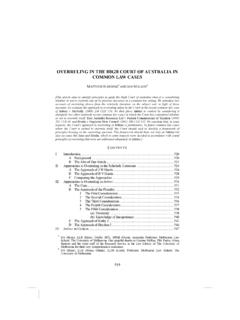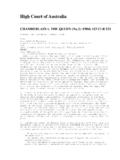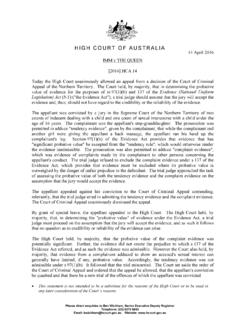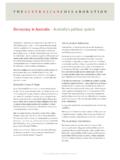Transcription of IN THE HIGH COURT OF SOUTH AFRICA - SAFLII …
1 Revised and typographically corrected version Republic of SOUTH AFRICA IN THE high COURT OF SOUTH AFRICA (WESTERN CAPE DIVISION, CAPE TOWN) Case number: 2298/2017 Before: The Hon. Mr Justice Binns-Ward Hearing: 10 August 2017 Judgment: 6 September 2017 In the matter between: KOS First Applicant MMC Second Applicant GNC Third Applicant HAC Fourth Applicant WJV Fifth Applicant HJV Sixth Applicant GENDER DYNAMIX Seventh Applicant and MINISTER OF HOME AFFAIRS First Respondent DIRECTOR-GENERAL: DEPT.
2 OF HOME AFFAIRS Second Respondent DEPUTY DIRECTOR-GENERAL: DEPT. OF HOME AFFAIRS: CIVIC SERVICES Third Respondent JUDGMENT 2 BINNS-WARD J: Introduction [1] This case came to COURT because of the difficulties transgendered persons in marriages that were solemnised in terms of the Marriage Act 25 of 1961 are experiencing in obtaining the recordal by the Department of Home Affairs of their sex/gender change, as provided for under the Alteration of Sex Description and Sex Status Act 49 of 2003 ( the Alteration Act ).
3 [2] The first to sixth applicants are three married couples. Their marriages were duly solemnised in terms of the Marriage Act. The first, third and fifth applicants (to whom I shall refer individually as KOS , GNC , and WJV , respectively,1 or collectively as the transgender spouses ) were registered at birth as males. That happened because they were born as biologically male. The second, fourth and sixth applicants, with whom KOS, GNC and WJV are respectively wed, are female.
4 After they had married, each of the transgender spouses underwent surgical and/or medical treatment to alter their sexual characteristics2 from those of a male to those of a female. They did this because from an early age they had experienced tormenting gender Their self-awareness was that of being female 1 At the commencement of the hearing in open COURT I made an order, as sought in terms of paragraph 20 of the notice of motion, Permitting the Applicants to: 1.
5 Use the First to Sixth Applicants initials instead of their full names on all COURT documents filed that will be available to the public. 2. File and provide to the respondents a confidential affidavit that contains the First to Sixth Applicants full names and unredacted versions of the annexures .. that will not be made publically available . The respondents did not oppose the making of the order. I granted it because I considered that it would be just and equitable in the circumstances. It serves to protect the affected applicants rights to human dignity and privacy, whilst not unduly limiting the operation of the freedom of expression rights under s 16 of the Bill of Rights.
6 However, it was inappropriate for the applicants to have moved for the relief only when the application was called in open COURT . The public is entitled to uncensored access to any documents filed at COURT in pending litigious matters unless a COURT for good reason directs otherwise; see Cape Town City v SOUTH African National Roads Authority and Others 2015 (3) SA 386 (SCA), [2015] ZASCA 58. I consider that in the circumstances the applicants should have applied ex parte in preliminary proceedings, possibly through the chamber book, for permission to file redacted papers upon the institution of the current application.
7 It would have been appropriate to grant them such relief, subject to the right of any third party which considered itself prejudiced thereby to approach the COURT , on notice to the applicants, for the amendment or rescission of the order. 2 The term sexual characteristics is taken from the Alteration Act, in which it is defined as meaning primary or secondary sexual characteristics or gender characteristics . According to the Act s definition provisions Primary sexual characteristics denotes the form of the genitalia at birth ; secondary sexual characteristics means those which develop throughout life and which are dependant (sic) upon the hormonal base of the individual person and gender characteristics are the ways in which a person expresses his or her social identity as a member of a particular sex by using style of dressing, the wearing of prostheses or other means.
8 3 Dysphoria is a term used in psychiatry. It is defined in the Concise Oxford English Dictionary 10th ed. (revised) (2002), as Psychiatry a state of unease or general dissatisfaction . 3 trapped in a male body. Transitioning4 was the means to liberate them from their gender dysphoria and express their self [3] The Alteration Act makes provision for the formal acknowledgment, recordal and legal consequences of such transitions. It allows for the alteration, upon application to the director-general of the Department of Home Affairs (who has been cited as the second respondent in these proceedings)
9 , of a person s sex description on the birth register and the provision to the person concerned of an altered birth It also provides that a person whose sex description has been altered is deemed for all purposes to be a person of the sex description so altered as from the date of the recording of such alteration .7 Section 3(3) provides that rights and obligations that have accrued to or been acquired by such a person before the alteration of his or her sex description are not adversely affected by the alteration.
10 The legal consequences of the recognition of a sex/gender-change in terms of the Alteration Act are therefore wholly prospective from the date of the recordal; the Act does not have any retrospective effect. [4] By virtue of its foundation in the agreement between the intending spouses to enter into it, marriage brings about mutual rights and obligations that have been recognised to be contractual in legal character, albeit sui generis and entailing public law The effect of s 3(3) of the Alteration Act is that the recordal of a postnuptial sex/gender change in respect of either or both the spouses has no effect on their mutual marital rights and 4 To transition in the relevant context means to adopt permanently the outward or physical characteristics of the gender one identifies with, as opposed to those associated with one s birth sex.

















